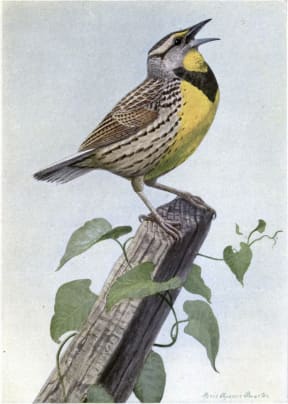
Illustration by Louis Agassiz Fuertes of an Eastern Meadowlark. Photo: Public Domain
The lark soars again to number one in Settling the Score 2016
The Lark Ascending - for solo violin and small orchestra by English composer Ralph Vaughan Williams has a reputation for being as British as cricket, wet weather and union jack tea towels… And yet every year Aotearoa appreciates its soaring violin melody and votes it near the top of RNZ Concert’s Settling the Score Poll. This year it’s in the top spot.
Larks or skylarks were introduced to New Zealand in the 1860s. Their most striking feature, (the one that gets poets and composers so excited) is the song in flight which can last for up to five minutes while the bird makes its ascent. Essentially this cry is all about territory. It’s the skylark calling out “Mine! This is ALL miiiiiiiine!” (for a full five minutes).
Vaughan Williams began his ‘Lark’ against the rumblings of war in 1914. He was inspired by the poem of the same name by English poet George Meredith: who in turn was inspired by the bird.
“He rises and begins to round,
He drops the silver chain of sound,”
War got in the way of composing and The Lark Ascending didn’t make its premiere until 1920.
It’s had a long and successful career since then. Apart from its frequent appearance on RNZ Concert’s Settling the Score, it’s a concert hall regular around the world and was chosen as Britain’s all-time favourite in a poll to decide the nation’s Desert Island Discs in 2011. And yet funnily enough it’s not a piece you can hum.
The Lark Ascending is not a walk in the park to play either. It is notoriously difficult for the soloist, but the best performances of it appear effortless, entitled and free – like the bird itself.
Watch violinist Janine Jansen perform 'The Lark Ascending' by Ralph Vaughan Williams
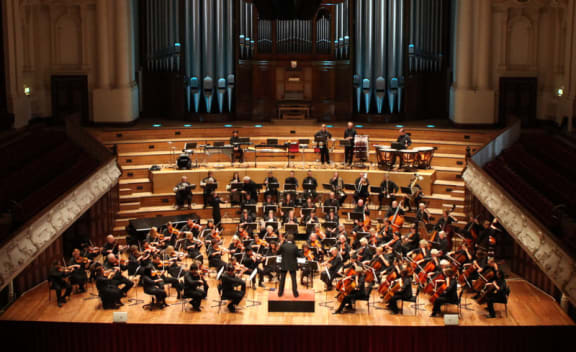
Auckland Symphony Orchestra Photo: Supplied.
RNZ Concert counted down New Zealand's favourite pieces of classical music for 2016, as voted for by you, the public. You can have a look at the full list, while here, Cynthia Morahan picks highlights from the day, including your feedback.
9-10pm hour
No. 2 Beethoven: Piano Concerto No 5 'Emperor'
The soloist is Xing Wang with the APO conducted by Matthew Coorey.
8-9pm hour
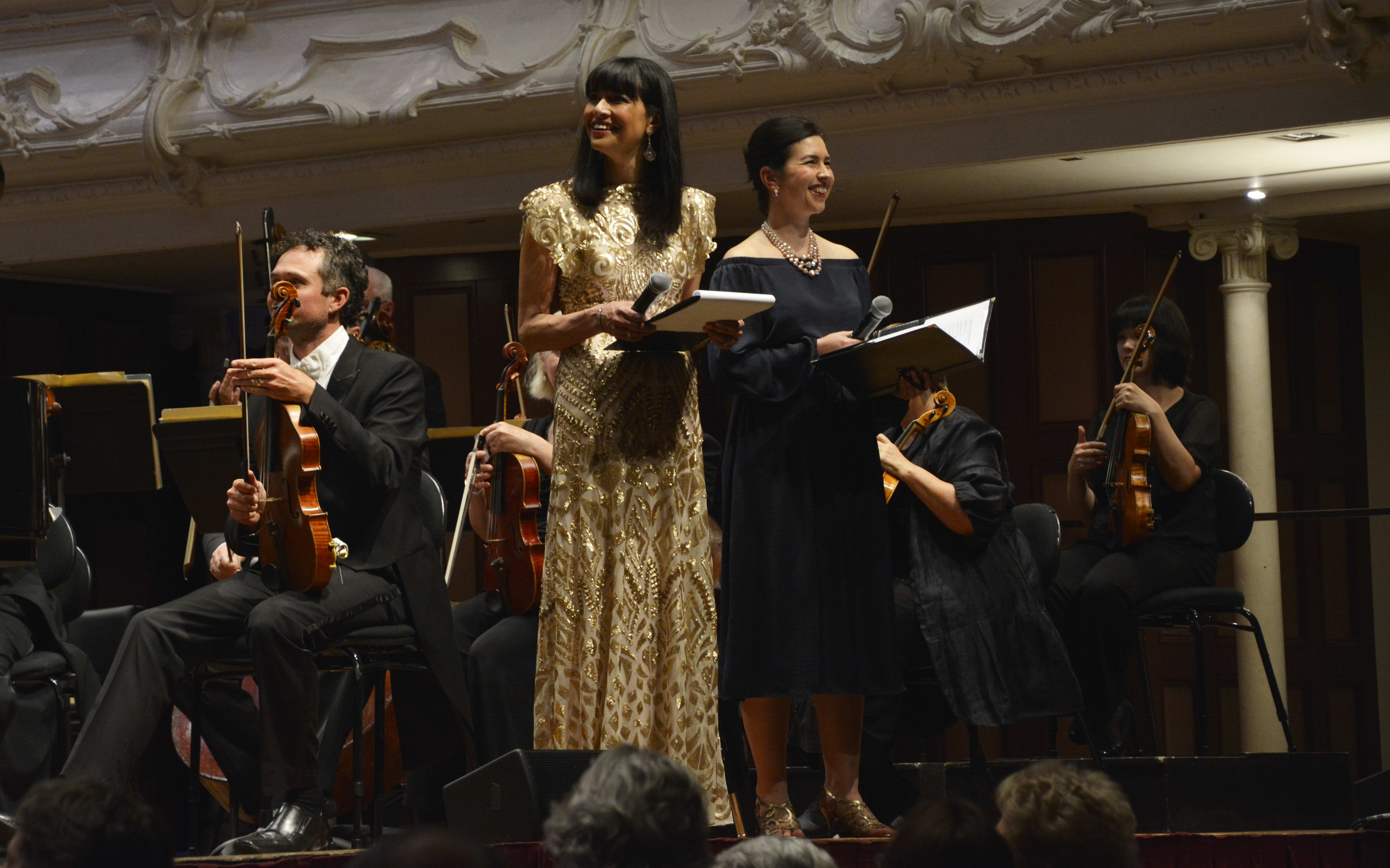
Settling the Score hosts Carol Hirschfeld and Clarissa Dunn from RNZ Photo: APO/Tiana Lyes
We are live at the Auckland Town Hall with the APO conducted by Matthew Coorey for Settling the Score Live! presented by Clarissa Dunn and Carol Hirschfeld.
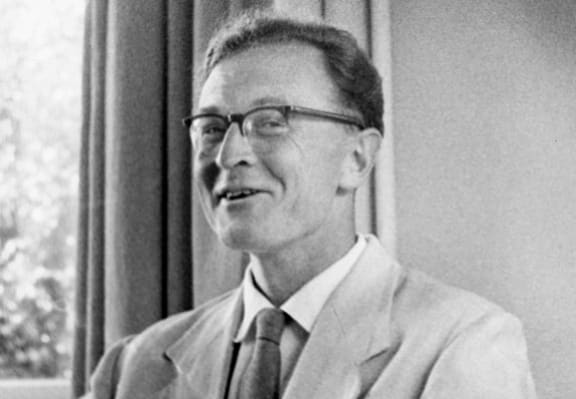
Happy Birthday Mr Lilburn Photo: Douglas Lilburn Trust
No. 43 Lilburn: Aotearoa Overture - performed at Settling the Score Live! as the 1st most popular New Zealand Composer and most popular New Zealand work.
Described as a work of “unabashed optimism” and “a musical tour of Godzone”, New Zealand Composer Douglas Lilburn wrote this work as a student in London in 1940.
Here’s the NZSO performing it in Geneva’s Victoria Hall on their 2010 European tour.
7-8 pm Highlight
No. 10 Handel: Messiah
It may feel a little early in the year to be hearing this work (although Christmas decorations are already up in at least one major supermarket around the country!) The work that premiered in Fishamble Street, Dublin in 1742 claims the tenth spot in Settling the Score this year.
Here's the whole work performed by more than 500 voices at the Sydney Opera House last year and also performed in Auslan (Australian Sign Language).
Charlotte Wilson takes over the helm at RNZ Concert for the last hour of Settling the Score before we go to the Auckland Town Hall for Settling the Score Live! with the Auckland Philharmonia Orchestra presented by Clarissa Dunn and Carol Hirschfeld.
6-7pm
No. 17 Vivaldi: Four Seasons
We broadcasted one of the best performances of this iconic work by New Zealand violinist Alan Loveday (some wonderful things come out of Palmerston North) with Neville Marriner conducting the Academy of St Martin in the Fields. If you think you've heard this work too often, take refuge in the fact that there are some very good reasons why it's good to listen to Vivaldi's Four Seasons.
Here is music historian Betsy Schwarz with 'Why should you listen to Vivaldi's Four Seasons?'
Listener Feedback:
(In response to Vaughan William's Fantasia on a Theme of Thomas Tallis) The most beautiful piece of music ever. Never tire of hearing this. Many thanks.
- Andrew.
Thank you so very much for a day of marvellous music. Greatly appreciated - and we still have hours to go! What bliss. Regards,
- Lynn
Greetings from me 2 all listeners and staff at radio concert 2gether we r SETTLING THE SCORE with this wonderful music thank you i am driving Ingill 2 Dunedin with fab reception gr8
- Anna
5-6pm Highlights
No. 21 Beethoven: Symphony No 5
Perhaps the most famous piece of classical music ever and yet it doesn't make the top 20 this year. Never mind, it still has the ability to cross divides of culture, language and, in some cases, species...
...And just in case you thought we had gone the way of the cat video here at RNZ, here's Liszt's clever arrangement for solo piano of Beethoven's 5th, played by Soheil Nasseri.
4-5 pm Highlights
No. 24 Holst: The Planets
This is another Settling the Score perennial favourite. Gustav Holst’s solar system suite The Planets. It should be noted he was talking about the planets in an astrological rather than an astronomical sense which explains why earth was omitted altogether.
There isn’t time for us to broadcast the whole suite, so here is a 1977 performance of Holst’s The Planets (in its entirety) by the Philadelphia Orchestra with conductor Eugene Ormandy
Listener Feedback:
Wonderful listening 2 the music on a wet wellington day, tks,
- Mary, Hataitai
Settling the Score is the perfect studying music as I prepare for my external exams
- Rose
In about 4 hours we'll be crossing live to the Auckland Town Hall to hear..?
Top secret rehearsals for #STS2016 are underway. No hints allowed. We can't even tell you the solo instruments! @RNZConcert #whatpiano pic.twitter.com/kjNURv2xju
— Akl Phil Orchestra (@aporchestra) November 9, 2016
3-4 hour
No. 31 Beethoven: Symphony No 3 in Eb, ‘Eroica’
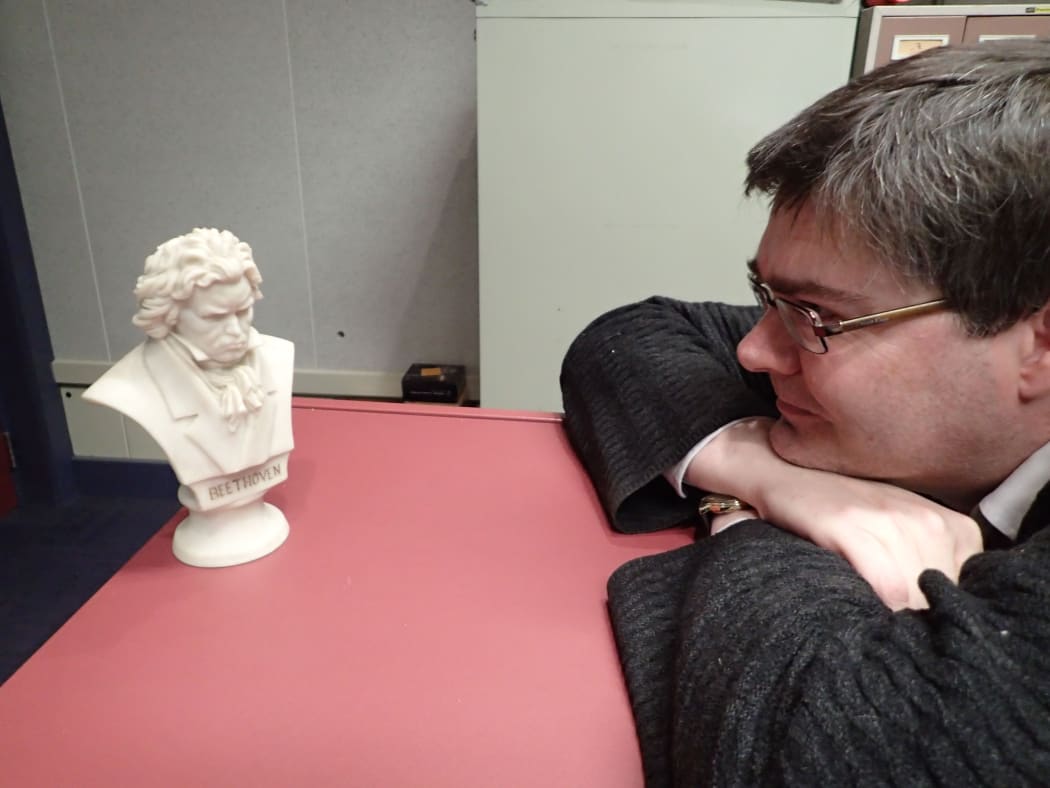
David Morriss and Ludwig van Beethoven Photo: Cynthia Morahan
The first Beethoven Symphony in the top 50 (there will be more to come)! We broadcast a version by the Swedish Chamber Orchestra conducted by Thomas Dausgaard, but presenter David Morriss suggested this recording by the Paris Conservatoire Orchestra conducted by Carl Schuricht. Part of a complete set of the symphonies recorded by EMI in the late 1950s in mono, at a time when most other companies had switched to stereo.
David Morriss says: “It’s one of my favourites. For me, there’s an appealing vitality to Schuricht’s conducting – not only his tempi, but his phrasing and the numerous subtle nuances he brings to the music. It’s something living and organic rather than just playing through the notes.”
2-3 hour
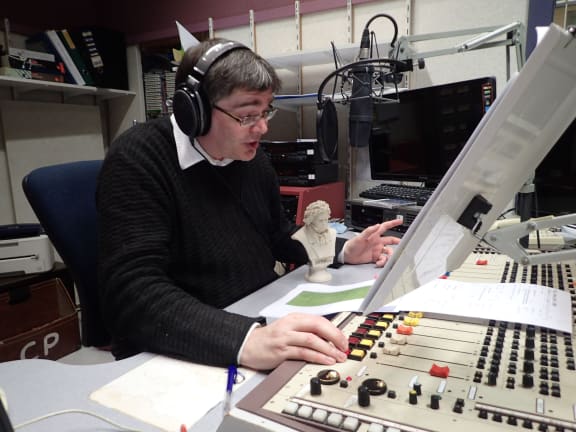
Presenter David Morriss (and Beethoven) Photo: Cynthia Morahan
David Morriss takes over the afternoon shift on Settling the Score, accompanied by an old friend.
No. 38 Pärt: Spiegel im Spiegel
Arvo Pärt identified himself as an RNZ Concert listener back in August when he tuned in (albeit remotely from Tallin, Estonia) to hear the APO perform his work ‘Collage sur B-A-C-H’ with the University of Auckland Chamber Choir under conductor Stephen Layton.
‘Spiegel im Spiegel’ written by Pärt in 1978 makes a yearly presence in Settling the Score.
Here’s violinist Anne Akiko Meyers, (a recent visitor to New Zealand) with pianist Reiko Uchida performing ‘Spiegel im Spiegel’ to a sold out house in New York City.
Listener Feedback:
Spiegel im Spiegel. Like looking into infinity. Beautifully played.
- Howard, Wellington
Not only is the music wonderful but so are the musicians. I want every day to be like this please.
- Phyllis, New Plymouth
So love Settling the Score we declared today a holiday.
- Lesley Sth Wairarapa
1-2 hour
No. 40 Bach: Goldberg Variations
Bach marks his third appearance in the countdown with the ‘Goldberg Variations’ – as played by Canadian Glenn Gould whose famous interpretation of these pieces earned them the nickname “Gould-berg Variations”. Watch Glenn Gould in this 1981 video completely absorbed in the music. His posture is terrible (due to his essential ‘favourite chair’) and he’s humming - but it’s perfect.
Listener Feedback:
Your Countdown fabulous entertainment.Thank you.
- Steve, Christchurch
Igor Stravinsky, helped change music 4ever with his ballet "Rite of Spring", of 1913 (No. 44 in Settling the Score). Whatever would his teacher, N Rimsky-Korsakov have thought of it?
- Ken Fisher
Am hearing many favourites, some of which I never knew the names, & now I do. Thankx.
- Anne, Takanini
12-1 pm Highlight
No: 46 Mahler: Symphony No 1 in D ‘The Titan’
Some ‘Mighty Mahler’ makes it into the top 50 with what Guardian music critic Tom Service called “one of the most spellbinding moments of symphonic inspiration in the 19th century”. Mahler’s Symphony No 1 began life as a symphonic poem and evolved from there.
If you have a spare 55 minutes, here’s an unforgettable performance by the Vienna Philharmonic with the baton in the hands of one Leonard Bernstein.
11-12 Highlight
No. 51 Smetana: Vltava, Ma Vlast

Vltava River in Prague Photo: supplied
This symphonic poem by Czech composer Bedrich Smetana (who didn’t shy away from nationalism like Tchaikovsky) calls out to anyone who’s ever crossed the Charles Bridge and seen the furious pace at which that river races through the Czech Republic.
Here’s Herbert von Karajan and the Berlin Philharmonic from 1983 giving the river its German name ‘Die Moldau’.
10-11 Highlight
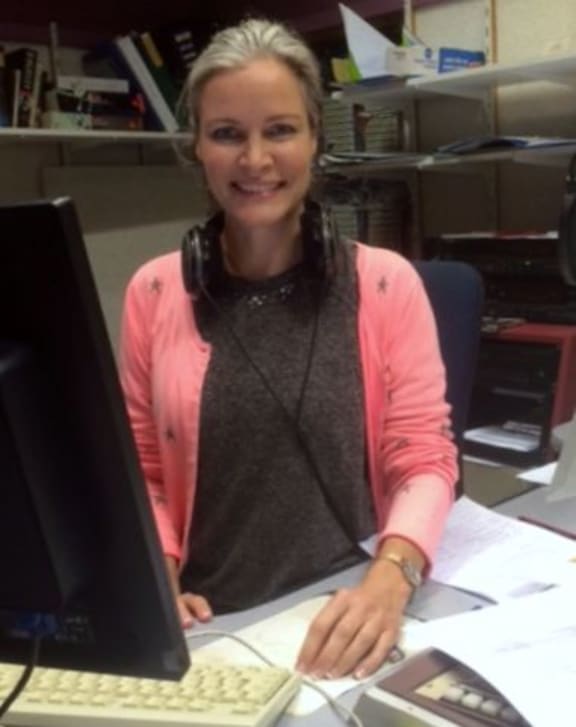
Presenter Amanda Brown in the studio Settling the Score Photo: Cynthia Morahan
Amanda Brown holds the fort in studio as she counts down the fifth hour of Settling the Score
No. 59 Tchaikovsky: 1812 Overture
Unlike most people, Tchaikovsky wasn’t fond of this work. It was a commission he grudgingly put together in a mere six weeks. Afterwards, he said it was written “without warmth or love”. However, it became a great earner for the Tchaikovsky estate so that must at least have made him happy.
A total of 16 cannon shots are written into the score. And if you missed them in the work we broadcast, here’s the final part of the work performed in London on 9 May 2012 with live (and slightly mis timed) gunfire from HMS Belfast.
9-10 Highlight
No. 64 Dvorak: Song to the Moon
No. 65 Dvorak: Symphony No. 8
It was going to be a miracle for there not to be at least one of Dvorak’s Symphonies in the countdown. These two spots are taken up by Dvorak’s most popular song from his opera ‘Rusalka’ and perhaps his second most popular symphony.
Here’s soprano Renee Fleming singing ‘Song to the Moon’ in Prague.
8-9 Highlight
No. 74 Grieg: Piano Concerto in A
Another hour, another piano concerto, a genre proving very popular amongst Settling the Score voters. Sadly this is Grieg’s only completed piano concerto written as a 24 year old on holiday in Denmark during the first year of his marriage to his beloved Nina.
Here’s pianist Arthur Rubinstein with the London Symphony Orchestra conducted by Andre Previn
No. 70 Farquhar: ‘Tango’ from Ring Round the Moon
New Zealand Composer David Farquhar comes in at number 70 with this Tango from his suite of dances ‘Ring Round the Moon’. It was originally commissioned in 1953 for the New Zealand Players production of the Jean Anouilh/ Christopher Fry play ‘Ring Round the Moon’.
Here’s an arrangement for piano duet performed by Margaret Neilson and David Farquhar. It’s available as part of 'Resound’ – a joint project between SOUNZ and RNZ:
Tango from 'Ring Round the Moon'
Listener Feedback:
Great timing, democracy can produce a whole day of uplifting music. Thanks Concert radio.
- Margaret, Carterton
Morning Rick... even more reason to listen all day today... have fun...
- Hamish, Auckland
7-8 am Highlight
No. 76 Mozart: Piano Concerto No. 21 in C
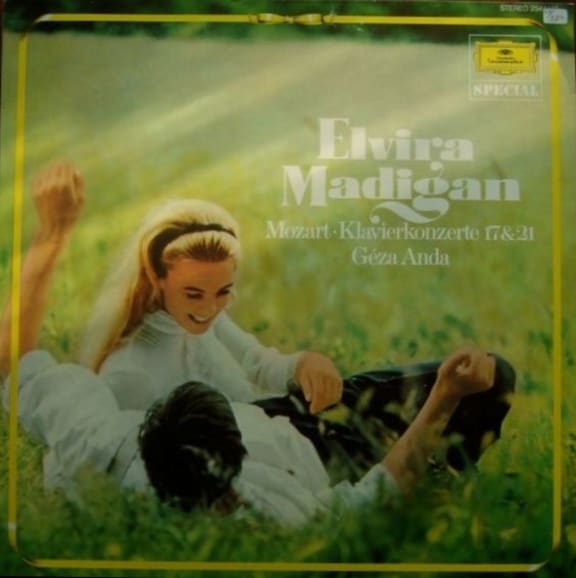
There are not many Settling the Score Countdowns where this work hasn’t popped up – if any. A perennial favourite that also goes by the name of a little-known Swedish film called ‘Elvira Madigan’. Poor Mozart had no idea he was writing film music when he wrote this now famous second movement.
6-7 am Highlights
No. 87 Aaron Copland: ‘Fanfare for the Common Man’
It could be in honour of a new American president, but Aaron Copland’s ‘Fanfare for the Common Man’ made it to number 87 this year, after not making it into the Countdown at all the previous few years.
Here’s a spirited performance from the New York Philharmonic with conductor James Levine
No. 90 Ravel: ‘Bolero’
The sound of the snare drum kicks off Settling the Score 2016 with Ravel’s mesmerising one-movement work ‘Bolero’ - New Zealand's 90th most favorite piece of classical music this year.
In case you missed it after 6 am, here’s Gustavo Dudamel conducting the Vienna Philharmonic.

